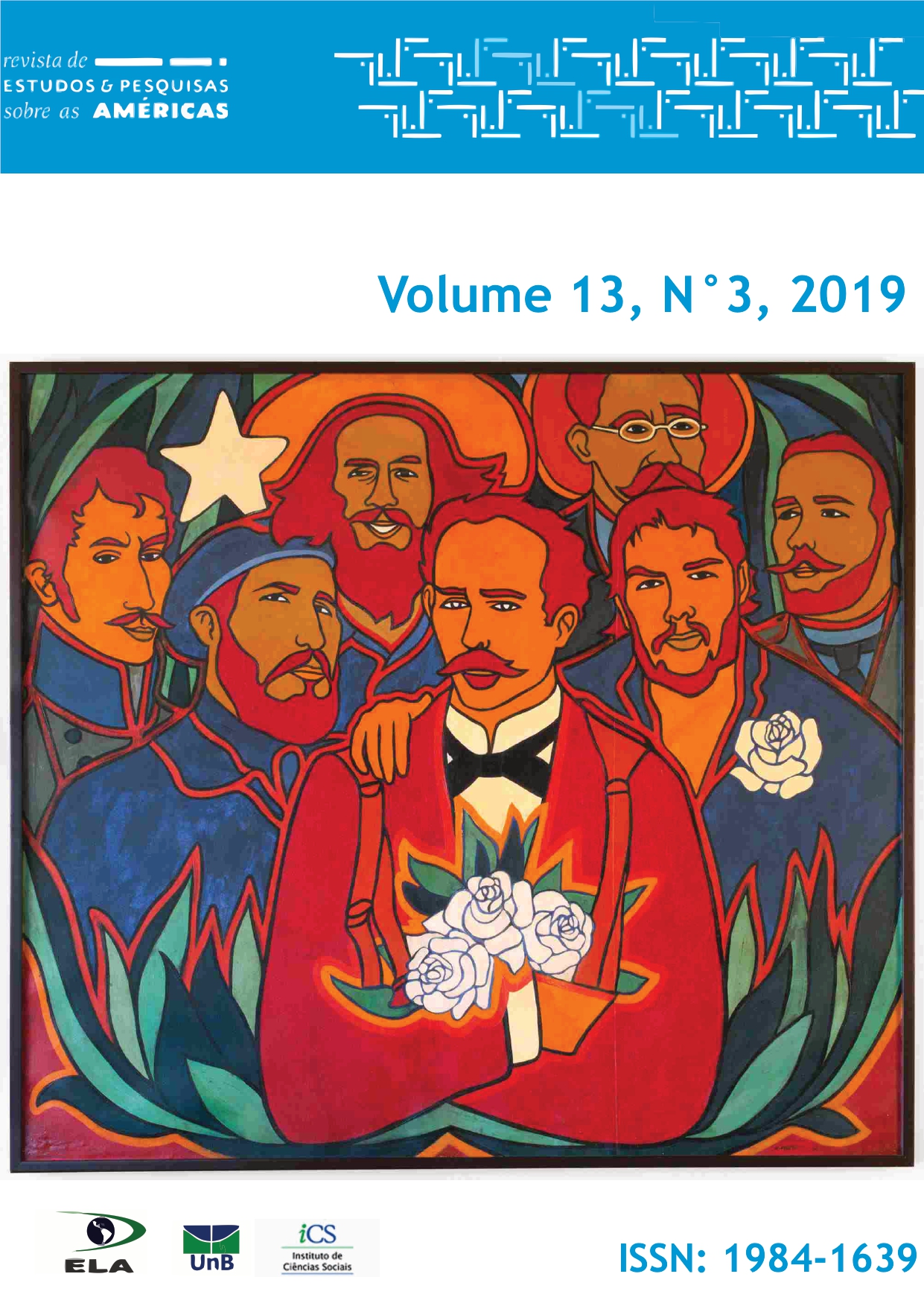Folklore, Afro-Cuban Religions and Racism in Santiago de Cuba.
DOI:
https://doi.org/10.21057/10.21057/repamv13n3.2019.27337Keywords:
Folklore. Racism. Cuba. Afro-Cuban religions.Abstract
The text about to develop a reflection on the intersections between formal cultural policies and afro-religious practices from an academic-cultural festival in the city of Santiago de Cuba. With investments in folk ensembles, following the triumph of the 1959 Revolution, many people saw their African-based religious practices taking spaces once denied to them. However, the measures taken by the revolutionary government, based on the idea that all social inequalities were the result of a capitalist bourgeois ideology, were not enough to end racial discrimination on the Island. Starting from two important events in the city of Santiago de Cuba, the Festival del Caribe and Carnival, I seek to raise some questions about the contexts surrounding events legitimized or not by the state.
Downloads
References
ARGYRIADIS, Kali; CAPONE, Stefania. “Cubanía et santería: les enjeux politiques de la transnationalisation religieuse (La Havane ”“ Miami) ». Civilisations, n. 51, pp. 81-137, 2004. Disponível em: https://journals.openedition.org/civilisations/668
ARGYRIADIS, Kali. “Religión de indígenas religión de científico: construccion de la cubanidad y santería”. Desacatos, n. 17, pp. 85-106, 2005a.
ARGYRIADIS, Kali. “El desarrollo del turismo religioso en La Habana y la acusación de mercantilismo”. Desacatos, n. 18 pp. 29-52, 2005c.
Disponível em:
http://desacatos.ciesas.edu.mx/index.php/Desacatos/article/view/1311/1152
BENTO, Fábio Régio. “Sobre o ateísmo do socialismo soviético ”“ origens exógenas, influência internacional e repercussão nas políticas públicas internacionais.” Revista eletrônica Correlativo, São Paulo, n. 2, pp. 461-488, 2017.
Disponível em:
https://www.metodista.br/revistas/revistas-ims/index.php/COR/article/view/8362/6153
BODENHEIMER, Rebecca. “National symbol or ‘a black thing’?: rumba and racial politics in Cuba in the era of cultural tourism.” Black Music Research Journal, Chicago: Columbia College; University of Illinois, n. 2, pp.177-205, 2013.
BODENHEIMER, Rebecca. La Conga. “Harvard review of Latin American.” Cambridge, v. 13, n. 3, 2014.
Disponível em: https://revista.drclas.harvard.edu/book/la-conga
CONCHA-HOLMES, Amanda D. “Cuban cabildos, cultural politic, and cultivating a transnational yoruba citizenry.” Cultural Anthropology, n. 3, pp. 490 -503, 2013.
DE LA FUENTE, Alejandro.“‘Tengo una raza oscura y discrminada’ el movimiento afrocubano: hacia un programa consensuado”. Nueva Sociedad, n. 242, pp. 92-105, 2012.
DÃAZ, Aisnara Perera; FUENTES, María de los Ángeles Meriño. El cabildo carabalí viví de Santiago de Cuba: familia, cultura y sociedad (1797-1909). Santiago de Cuba, Ed. del Oriente, 2013.
DONGHI, Tulio Halperin. Historia contemporánea de América Latina. Madrid, Ed. Alianza, 6. Reimp. ([1969] 2005).
ESPINA PRIETO, Mayra Paula. “Pobreza, desigualdade e desenvolvimento: o papel do estado na experiência cubana seus desafios atuais.” In.: A. CIMADAMORES; D. HARTLEY; J SIQUEIRA. A pobreza do estado: reconsiderando o papel do estado na luta contra a pobreza global. Buenos Aires, CLASCO, 2006, pp. 191-208.
Disponível em: http://biblioteca.clacso.edu.ar/ar/libros/crop/pobreza/08prieto.pdf
FARIAS, Déborah Barros Leal. “Contextualizando a invasão à Baia dos Porcos.” Revista Brasileira de Política Internacional, v. 51, n. 1, pp. 105-122, 2008.
GIRALT, Maikel Ponts. “Educación intercultural y antirracista: un acercamiento desde la Universidad cubana.” Paulo Freire Revista de Pedagogía Crítica, n.18, pp. 203-220, 2017.
GIRVAN, Norman. El Caribe: dependência, integración y soberanía. Santiago de Cuba, Ed. del Oriente, 2012.
GONZÁLEZ, Yasser Socarrás. Je est une autre : a construção da invisibilidade negra no cinema cubano produzido pelo ICAIC. Dissertação (mestrado em Antropologia Social) Universidade Federal de Santa Catarina. Florianópolis, 2018.
GUEVARA, Ernesto Che. El socialismo y el hombre en Cuba. [Montevideo] [s. n.], 1964.
HODELÃN, Deymiselis Baró; FIGUEROA, Yisell Isalgue. Aurora Pie Yan. “Una Leyenda viviente de las tradiciones culturales haitianas en Guatánamo.” Santiago de Cuba, v. 138: 727-759, 2015.
LABRADA, Yosmani Mayeta. La violencia “arrola” junto a la Conga de Los Hoyos en Santiago de Cuba. Cubanet, 2018.
Disponível en: https://www.cubanet.org/destacados/la-violencia-arrolla-junto-la-conga-los-hoyos-santiago-cuba/
LÓPEZ, Rafael Brea. “Santiago de Cuba: Carnaval y guerras de independencia (Siglo XIX)”. Batey: Revista cubana de antropología sociocultural. Vol. III, n. 3, pp. 98”“113, 2013.
OLIVEIRA, Bianca Ferreira. Etnografia de uma cadena: sobre interdependência e hierarquia entre religiões afro-cubanas em Santiago de Cuba. Tese (doutorado em Antropologia Social) Universidade Federal de Santa Catarina. Florianópolis, 2019.
ORIZ, Fernando. Contrapunteo cubano del tabaco y el azucar. La Habana, Ed. Editorial de Ciencias Sociales, [1940] 1983.
ORTIZ, Fernando. Ensayos Etnográficos. La Habana, Ed. Editorial de Ciencias Sociales, 1984.
RAMÃREZ, Sandra Abd’Allah -Álavarez. “Elogia de la altea, la racialidad en discusión.” Temas, n.79, pp 117-119, 2014.
RAUSENBERGER, Julie. “Santurismo: the commodification of santería and the touristic value of afro-cuban derived religions in Cuba." Almatourism, n.8, pp. 150-171, 2018.
SCHIMIDT, Jalane. “Locked Together: The Culture and Politics of 'Blackness' in Cuba.” Transforming Anthropology, n. 2, pp. 160-164, 2008.
SOUZA, Bárbara Oliveira. A ambígua condição negra em Cuba relações raciais e mobilizações coletivas antirracistas. Tese (doutorado em Antropologia Social) Universidade de Brasília. Brasília, 2015.
TORRES, Roberto Zurbano. “Racismo vs socialism en Cuba: un conflicto fuera de lugar (apuntes sobre/contra el colonialismo interno).” Meridional Revista chilena de estudios latinoamericanos, n.4, pp. 11-40, 2015.
VIDDAL, Grete Tove. Vodú Chic: Cuba’s Haitian Heritage, the Folfloric Imaginary, and the State. Doctoral dissertation, Harvard University, 2013.
Downloads
Published
How to Cite
Issue
Section
License
The published material is the property of the Journal, and may be reproduced in whole or in part with indication of the source.
Copyright: Authors will be responsible for obtaining the copyright of the material used. Authors who publish in this journal agree to the following terms:
a)Authors retain the copyright and grant the journal the right of first publication, with the work simultaneously licensed under
the Creative Commons Attribution License which allows the sharing of work with acknowledgment of authorship and initial publication in this journal.
b) Authors are authorized to take additional contracts separately, for non-exclusive distribution of the version of the work published in this journal (eg, publish in institutional repository or as a book chapter), with acknowledgment of authorship and initial publication in this journal.
c) Authors are allowed and encouraged to publish and distribute their work online (eg in institutional repositories or on their personal page) at any point before or during the editorial process, as this can generate productive changes as well as increase the impact and the citation of the published work (See The Effect of Free Access).
















